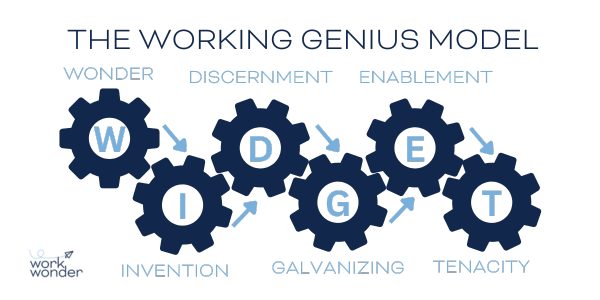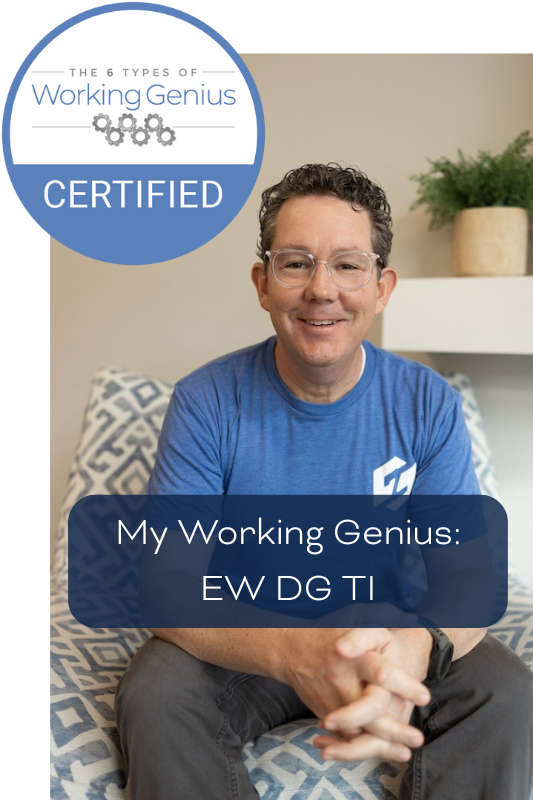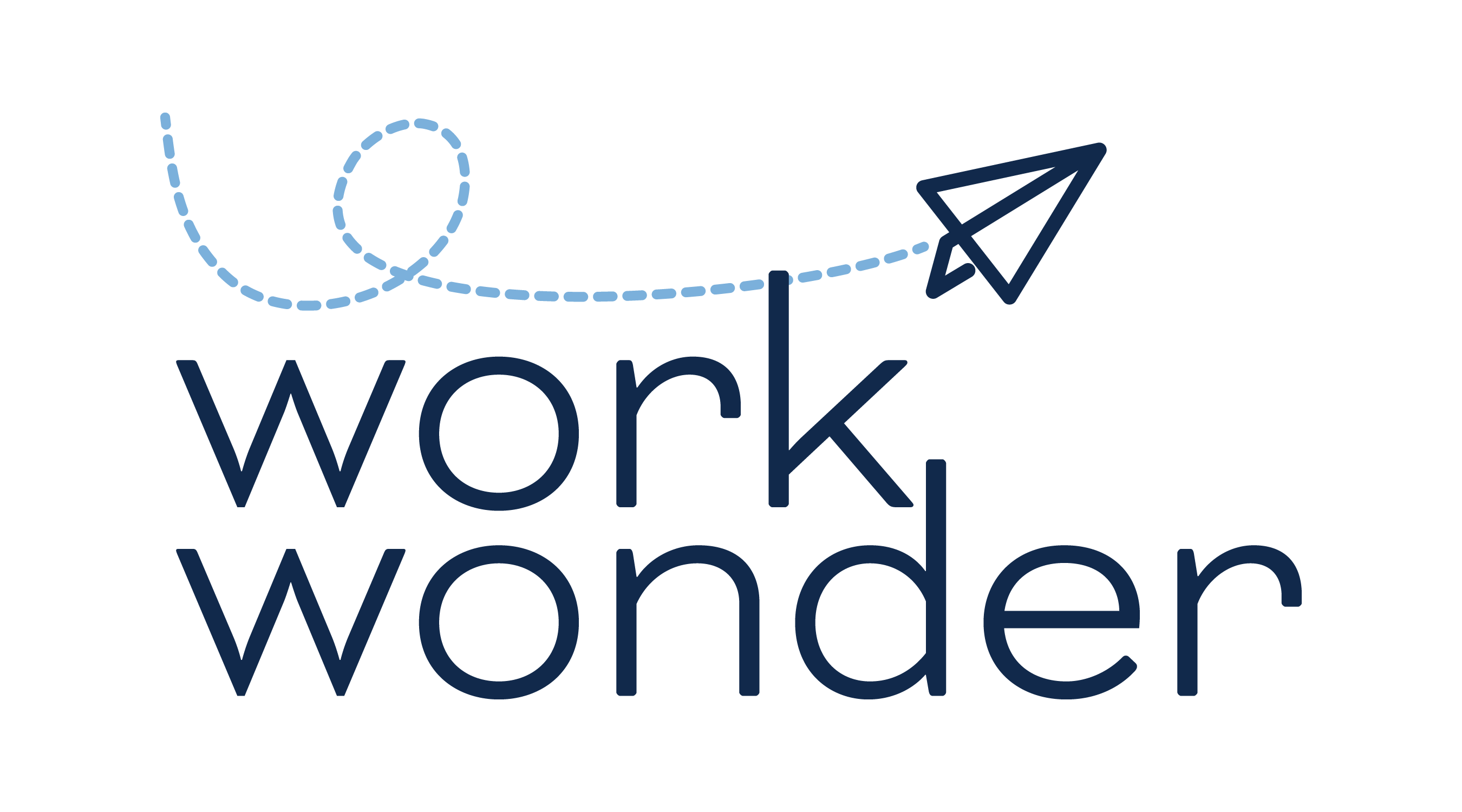Guide to Understanding Your Working Genius Results
The Working Genius framework, created by Patrick Lencioni, reveals there are six distinct types of work required for any project to succeed, and every person has a unique relationship with each type.
After you take the Working Genius assessment, your results will be your unique variation of the six types and will look something like: ID WG ET
So how can we use these six letters to find more joy and fulfillment in our work and become more productive?

Unpacking The Six Types of Working Genius
First, a quick overview of the six types of work that are the essential ingredients needed to turn any idea into reality:
- Wonder involves pondering possibilities and asking "what if?" These are the people who naturally spot potential and see opportunities others miss. They're always questioning the status quo and imagining what could be.
- Invention is about creating innovative solutions and ideas. When faced with a challenge, these individuals instinctively generate creative approaches and original concepts that move projects forward.
- Discernment means intuitively evaluating and refining concepts. These people have a natural ability to assess ideas, identify what will work, and suggest improvements.
- Galvanizing focuses on mobilizing people to take action. These individuals excel at rallying others around an idea, building enthusiasm, and creating the momentum needed to launch initiatives.
- Enablement provides flexible support wherever needed. These people naturally step in to help others succeed, offering assistance, resources, and encouragement to keep projects moving.
- Tenacity drives projects to completion with excellence. These people have the persistence to push through obstacles and ensure work gets finished to a high standard.
Understanding Genius, Competencies, and Frustrations
The order your results are listed reflect the degree to which tasks within those areas either bring you energy or drain you.
Let's use our ID WG ET example:
Two Zones of Genius (I, D) are areas where you naturally thrive and feel energized. This is work that doesn't feel like work — it's fulfilling, engaging, and you're naturally good at it. When you're operating in your genius zones, you bring energy to the team and produce exceptional results.
Two Zones of Competency (W, G) are areas where you can perform adequately but don't find particular joy. You're capable in these areas, but the work doesn't energize you. It's neutral territory. You can do it when needed, but it's not where you shine.
Two Zones of Frustration (E, T) are work types that drain you and decrease your effectiveness. These tasks feel difficult, energy-sapping, and often produce subpar results. When you're forced to work primarily in frustration zones, both you and your team suffer.
The Three Phases of Work
.png)
The six types of working genius operate across three distinct phases, each representing a different phase of how work gets done:
Ideation encompasses Wonder and Invention. This is the realm of possibilities and creative solutions. Teams need people who can spot opportunities and generate innovative approaches to challenges.
Activation includes Discernment and Galvanizing. This is where ideas get refined and momentum builds. Teams need people who can evaluate concepts and rally others around the best ideas.
Implementation covers Enablement and Tenacity. This is where plans become reality. Teams need people who can provide support and drive projects to completion.
Why Every Genius is Essential
Every single type of genius is necessary for project success. You can't skip any of them without skipping people.
- Without Wonder, teams miss opportunities and fail to innovate.
- Without Invention, they lack creative solutions to challenges.
- Without Discernment, they pursue weak ideas or miss critical flaws.
- Without Galvanizing, great ideas never gain traction.
- Without Enablement, people struggle without necessary support.
- Without Tenacity, projects remain unfinished.
When teams have representation across all six types, individuals can work primarily in their zones of genius while receiving support in their frustration zones.
As you might imagine, projects run much smoother!
Takeaways from Your Working Genius Results
I'll use my own Working Genius findings here. I'm Will and my Working Genius is EW DG TI.

As I have reflected on my work life through the lens of my Working Genius, I have begun to sense when I am operating more in my competencies or frustrations.
While every job is a six letter job, I have become more curious about how to spend more time in my areas of genius (Enablement + Wonder) and to look for support in my areas of competence and frustration.
One good example of this is galvanizing, which is a competence of mine. I do not find joy in trying to persuade or “sell” people on an idea. I can do it, but I don’t enjoy it. Other people are definitely better at galvanizing than I am and understanding my Working Genius results have helped me get more comfortable asking for support from others, especially those who thrive at galvanizing.
Take the Next Step
Transform Your Team with a Working Genius Workshop
As a certified Working Genius facilitator, I offer two distinct Working Genius workshop approaches designed to fit your organization's specific needs:
Intact Team Deep-Dive
- Designed for intact teams of 8-10 people ready to completely transform how they collaborate.
- Focuses on customized practical application, role optimization, and building new collaboration patterns using each member's unique genius.
- Builds a team map of collective strengths, identify gaps, and create actionable
High-Level Organizational Introduction
- Perfect for leadership teams who want to introduce Working Genius concepts across their entire organization
- Covers foundational understanding and practical tools for implementation at scale, empowering leaders to bring these concepts back to their individual teams.
- Learn how to structure meetings that engage, reduce friction in project management, and improve overall job satisfaction.
Both workshops are fully customizable to address your team's specific challenges and organizational context. Whether you need a half-day introduction or a multi-day retreat, we'll design an experience that delivers immediate, practical benefits for your team.
Ready to Unlock Your Team's Genius?
Reduce friction, improve meetings, strengthen team dynamics, accelerate projects, and significantly improve job satisfaction using the Working Genius framework.
Book a free discovery call and let's explore how understanding and integrating the Working Genius can transform your organization's impact and culture.
